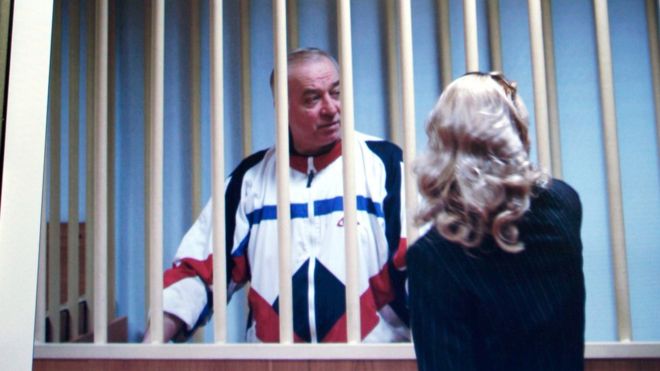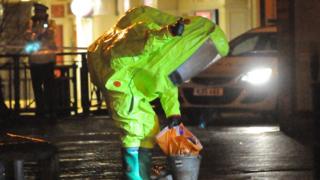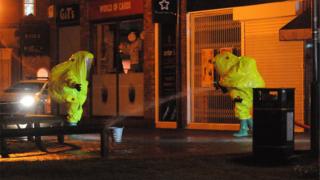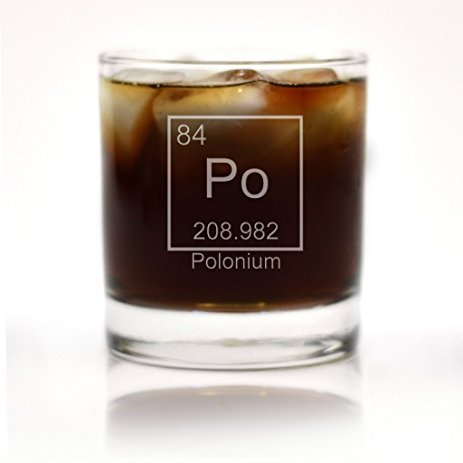RUSSIA ATTEMPTED TO MURK ANOTHER SPY WHO DEFECTED TO THE U.K.!!!!!
Critically ill man 'former Russian spy'

Sergei Skripal, pictured here on the day of his sentencing in August 2006, was jailed for 13 years
A man who is critically ill after being exposed to an unknown substance in Wiltshire is a Russian national convicted of spying for Britain, the BBC understands.
Sergei Skripal, who is 66, was granted refuge in the UK following a "spy swap" between the US and Russia in 2010.
Police declared a major incident on Sunday after a man and a woman were reported ill at a shopping centre in Salisbury.
The substance has not been identified.
A number of locations in the city centre were cordoned off and the A&E department was closed.

The hospital's A&E was closed on Monday while two people were treated
Skripal, who is a retired Russian military intelligence colonel, was jailed for 13 years in 2006 for spying for Britain.
He was convicted of passing the identities of Russian intelligence agents working undercover in Europe to the UK's Secret Intelligence Service, MI6.
Russia said Col Skripal had been paid $100,000 for the information, which he had been supplying from the 1990s.
He was one of four prisoners released by Moscow in 2010 in exchange for 10 US spies, as part of a swap.
Col Skripal was later flown to the UK.
He and a woman, thought to be in her 30s, are being treated at Salisbury District Hospital.
Police are investigating whether a crime has been committed, following the incident which began at 16:15 GMT on Sunday at the Maltings shopping centre in central Salisbury.

Public Health England has not confirmed what the substance was
An area around the Maltings shopping centre and several other parts of the city were cordoned off as teams in full protective gear used hoses to decontaminate the street.
Neighbours at Skripal's home in Salisbury say police arrived around 17:00 GMT on Sunday and have been there ever since.
They said he was friendly and in recent years had lost his wife.
This breaking news story is being updated and more details will be published shortly. Please refresh the page for the fullest version.

Were you in the area at the time? Have you been affected by the incident? You can share your experience by emailing haveyoursay@bbc.co.uk.
Please include a contact number if you are willing to speak to a BBC journalist. You can also contact us in the following ways:
- WhatsApp: +447555 173285
- Tweet: @BBC_HaveYourSay
- Send pictures/video to yourpics@bbc.co.uk
- Upload your pictures/video here
- Send an SMS or MMS to 61124
Russian spy critically ill after being 'poisoned' by unknown substance in Salisbury

Sergei Skripal is being treated in hospital
A man who is critically ill after exposure to an unknown substance in Salisbury, is a former Russian spy, it is understood.
Sergei Skripal, 66, who was jailed in Russia for treason, but later came to the UK as part of a 'spy swap', collapsed in a shopping centre in Salisbury on Sunday.
He and a woman were rushed to hospital where they are still being treated.
It is thought the pair may have been exposed to the powerful synthetic drug, Fentanyl, which is up to 10,000 times more powerful than heroin and has been linked to scores of deaths in the UK.
A major incident was later declared at Salisbury hospital and its Accident & Emergency unit had to be closed.
In a statement, temporary Assistant Chief Constable, Craig Holden of Wiltshire Police, said: "The two people – a man aged in his 60s, and a woman aged in her 30s – were found unconscious on a bench in The Maltings in Salisbury.
“Police officers, as well as colleagues from the ambulance and fire services attended the scene and cordons were put in place.
“The pair, who we believe are known to each other, did not have any visible injuries and were taken to Salisbury District Hospital. They are currently being treated for suspected exposure to an unknown substance. Both are currently in a critical condition in intensive care."
“Because we are still at the very early stages of the investigation, we are unable to ascertain whether or not a crime has taken place."
Mr Skripal is a former Russian army colonel, who was convicted of passing the identities of Russian agents working in Europe to MI6.
In 2006 he was sentenced to 13 years in jail for spying for Britain, with Russian prosecutors claiming he had taken tens of thousands of pounds of the security services.
He came to the UK in 2010 as part of a spy swap, and later settled in Salisbury, Wiltshire.
@DonKnock @dza @88m3 @wire28 @smitty22 @fact @Hood Critic @ExodusNirvana @Blessed Is the Man @dtownreppin214 @JKFrazier @tmonster @BigMoneyGrip @Soymuscle Mike @.r. @Dorian Breh @Dameon Farrow @TheNig @VR Tripper @re'up @Blackfyre_Berserker @Cali_livin



